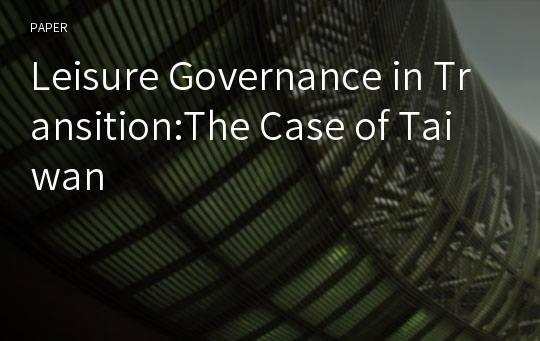Leisure Governance in Transition:The Case of Taiwan
(주)학지사
- 최초 등록일
- 2015.03.24
- 최종 저작일
- 2006.01
- 19페이지/
 어도비 PDF
어도비 PDF
- 가격 4,800원

* 본 문서는 배포용으로 복사 및 편집이 불가합니다.
서지정보
ㆍ발행기관 : 한국여가문화학회
ㆍ수록지정보 : 여가학연구 / 4권 / 1호
ㆍ저자명 : Jerry C. Y. Liu
목차
1. Introduction
2. Leisure in Context of Anti-communism and Moral Didacticism (1949-1969)
3. Deregulation and Leisure as "Re-creation" (1970-1989)
4. A Horse Running Wild: Towards a Multifaceted Leisure Policy (1990-present)
5. Decentered Portfolios for Leisure Governance
6. Conclusion
한국어 초록
Leisure governance in Taiwan has been under swift transition during the past decades. Under the influence of a rigid military-political milieu, leisure policies of the 1950s and 1960s were characterized of dogmatic teachings of anti-communism and moral-ethical didacticism. During the 1970s and 1980s, with the lift of the Martial Law it had marked a new era for deregulation of leisure. The post-1990s period manifests an even more complicated environment for the policing of leisure. New driving forces and thinking tools of leisure policy including multiculturalism, the indigenous ethnic revival, local populism, the construction of a new Taiwanese consciousness, the postmodern social playfulness of politics, and the disinterested general public for political instructions of leisure, are now pulling the carriage of leisure governance towards all possible directions. However, the paper argues that such development does not imply a strategic progress or advancement of a new mechanism of leisure governance that has converted from a "negative" policing to a "positive" acceptance of leisure diversity. The study suggests that the style of leisure policy today is no longer a simple result of a government's "free choice" in ideology, moral-ethical instructions, and resorts to economic benefits. Rather, it is a much more complicated compromising process between governments and different social-economic-cultural agents and currents. Substituting the question of "freedom of choice" and "self-determinism", the new task for leisure governance in the 21st century is the recognition of needs for the reinterpretation of intrinsic satisfaction in leisure, and the acquisition of new meanings for leisure in Taiwanese society.
영어 초록
Leisure governance in Taiwan has been under swift transition during the past decades. Under the influence of a rigid military-political milieu, leisure policies of the 1950s and 1960s were characterized of dogmatic teachings of anti-communism and moral-ethical didacticism. During the 1970s and 1980s, with the lift of the Martial Law it had marked a new era for deregulation of leisure. The post-1990s period manifests an even more complicated environment for the policing of leisure. New driving forces and thinking tools of leisure policy including multiculturalism, the indigenous ethnic revival, local populism, the construction of a new Taiwanese consciousness, the postmodern social playfulness of politics, and the disinterested general public for political instructions of leisure, are now pulling the carriage of leisure governance towards all possible directions. However, the paper argues that such development does not imply a strategic progress or advancement of a new mechanism of leisure governance that has converted from a "negative" policing to a "positive" acceptance of leisure diversity. The study suggests that the style of leisure policy today is no longer a simple result of a government's "free choice" in ideology, moral-ethical instructions, and resorts to economic benefits. Rather, it is a much more complicated compromising process between governments and different social-economic-cultural agents and currents. Substituting the question of "freedom of choice" and "self-determinism", the new task for leisure governance in the 21st century is the recognition of needs for the reinterpretation of intrinsic satisfaction in leisure, and the acquisition of new meanings for leisure in Taiwanese society.
참고 자료
없음


























